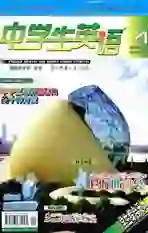七年级下册Units 7~12 热点考点讲与练
2010-06-08魏炳玉
魏炳玉
1. —What does he look like? 他长什么样?
—Well, hes really tall. 噢,他确实很高。
【点拨】 look like的意为“看起来像”、“长得像”,多用来询问或描述人的外貌或物品的外观等。询问“某人长相”怎么样时,要用“What do/ does…look like?”。例如:
The boy looks like his father. 这个男孩看起来像他爸爸。
—What does your friend look like? 你的朋友长什么样?
—She is tall and has long hair. 她高高的个子,留着长发。
2. She never stops talking!她从不停止讲话。
【点拨】 stop是动词,意为“停止”,常用于“stop doing sth.”和“stop to do sth.”结构中。stop doing sth.表示“停止做某事(正在做着的事)”,doing sth.作stop的宾语;stop to do sth.表示“停下来(正在做的事)去做另外一件事”,to do sth.是目的状语。例如:
He is tired. He stops to have a rest. 他累了,他停下来休息一下。
3. “ I dont think hes so great,” says Ruth from New York. 来自纽约的Ruth说:“我认为他没那么伟大”。
【点拨】 1)I dont think是主句,hes so great是宾语从句。英语中,think后面接宾语从句时,若从句为否定的,一般要否定主句,而不否定从句。例如:
I dont think you are right. 我认为你不对。
2)say意为“说、讲”,强调所说的内容。而speak作“说、讲”时,强调说话的能力;说某种语言时,要用speak。例如:
Please say it again. 请再说一遍。
Can you speak English? 你会讲英语吗?
4. Id like some noodles. 我想要一些面条。
【点拨】 would like意为“想要”,相当于want,但比want的语气委婉;后面可接名词或动词不定式。含有would like的句子,在变为一般疑问句时,把would提到句首。例如:
I would like to watch TV. 我想看电视。
Would you like some apples? 你想要几个苹果吗?
5. What size bowl of noodles would you like? 你们想要多大碗的面条?
【点拨】 What size意为“多大号”、“多大尺寸”,用来引导特殊疑问句。例如:
What size are your shoes? 你的鞋是多大号的?
6. What about your friend, Carol? 你的朋友怎么样,卡罗尔?
【点拨】 What about ...? 是口语中很常用的一个句型,意为“……怎么样?”,与How about ...?的意思一样。一般用来征询对方的意见或看法、提出请求或建议等。后面可跟名词、代词、动词-ing形式。例如:
I like swimming very much. What about you? 我非常喜欢游泳,你呢?
What about swimming this afternoon? 今天下午去游泳怎么样?
7. Old Henry looked for his dog. 老亨利找他的狗。
【点拨】 look for意为“寻找”,强调“找”的过程;find意为“找到”,强调“找”的结果。例如:
What is he looking for? 他在找什么?
Did you find your pen? 你找到你的钢笔了吗?
8. Then it was time to go home. 该回家了。
【点拨】 Its time to do sth. 是一个固定句型,意为“该做某事了”、“是做某事的时候了”。例如:
Its seven oclock. Its time to go to school. 七点了,该去上学了。
9. That made me feel very happy. 那使我感到很高兴。
【点拨】 make用作使役动词时,意为“使、让”,常用于“make sb. do sth.”结构中,意为“使/让某人做某事”。例如:
They made the young men work ten hours a day. 他们让这些年轻人每天工作10个小时。
10. We had great fun playing in the water. 我们在水里玩得很快乐。
【点拨】 have fun doing sth. 意为“做某事很有乐趣/快乐”。例如:
We have fun playing computer games. 我们玩电脑游戏非常快乐。
11. ... so we decided to play tennis. ……因此我们决定打网球。
【点拨】 动词decide意为“决定、下决心”,decide to do sth. 表示“决定做某事”时,后要跟动词不定式作宾语。类似的动词还有want等。例如:
She decided to buy a new bike. 她决定买一辆新自行车。
12. What do you think of soap operas? 你认为肥皂剧怎么样?
【点拨】 What do you think of ...?意为“你认为……怎么样?”,是用来询问对方对某事、某物或某人的看法、态度,相当于How do you like ...?句型。例如:What do you think of the story? =How do you like the story? 你认为这个故事怎么样?
13. Welcome to 9 oclock Weekend Talk. 欢迎来到九点钟的《周末访谈》节目。
【点拨】 Welcome to ... 意为“欢迎来到……”,to为介词,后面要跟地点名词,若接地点副词时,则不用介词to。例如:
Welcome home!欢迎回来!
Welcome to Beijing! 欢迎来北京!
14. Were talking to Alan, a thirteen-year-old boy. 我们正在与Alan,一个13岁的男孩谈话。
【点拨】 由“数词+名词+形容词”构成的复合形容词,每个词的中间要用连字符号“-”,且名词要用单数形式。例如:
Carol is an eight-year-old girl. 卡罗尔是一个八岁的女孩。
15. I enjoyed reading your “Whats Cool?” article in the school magazine. 我喜欢读学校杂志上你的那篇“Whats cool?”的文章。
【点拨】 动词enjoy后面可接名词、代词或动词-ing形式。例如:
Do you enjoy working here? 你喜欢在这儿工作吗?
16. Dont run in the hallways. 不要在走廊里乱跑。
【点拨】 祈使句通常无主语,由动词原形来开头,为使语气委婉,可在句首或句尾加上please一詞。否定句一般直接在句首加上Dont来构成。例如:
Dont be late next time. 下次不要迟到了。
17. We have to clean the classroom. 我们不得不打扫教室。
【点拨】 have to意为“不得不;必须”,后面要跟动词原形,有人称、数和时态的变化,表示受客观原因限制,不得不去做某事。变疑问句或否定句要借助助动词do/does。例如:
Its too late. I have to go home now. 太晚了,我现在必须回家。
巩固练习
()1. —_______?
—Hes a tall man with short hair.
A. How is he B. What does he like
C. What is heD. What does he look like
()2. They are too tired, so they stop _______ and
have a rest.
A. working B. to work C. work
()3. People usually _______“Hello” to each other
when they make a phone call.
A. sayB. tellC. talkD.speak
()4. —What are you going to do this weekend?
—Id like _________ my parents.
A. to visitB. visitC. visiting
()5. When Mary couldnt see her mother, she began
to cry and ________ her.
A. look for B. look afterC. look at
()6. —Hurry up! Its time ________ home.
—Im coming.
A. goB. go toC. going D. to go
()7. —How do you feel when you watch the
national flag go up?
—It makes me ________ very proud.
A. felt B. to feel C. feeling D. feel
()8. We went to the beach and had great fun
_______ in the water.
A. to playB. playing C. played
()9. —Whats your plan for the summer holidays?
—Ive no idea, but Ive decided ________ at
home and have a good rest first.
A. stay B. to stay C. stayedD. staying
()10. Ben, dont you think such a task is too
difficult for _________ boy?
A. a 8 year old B. an 8-year-old
C. the 8-years-old
()11. I enjoy _________ my bike in the moun-
tains. Its not always easy, but exciting.
A. rideB. rodeC. to rideD. riding
()12. —I cant give up smoking, doctor.
—For your health, Im afraid you ________.
A. may B. canC. have to
()13. —What do you ______ your hometown?
—I love it very much.
A. look atB. talk about
C. think ofD. think over
14. 根据汉语提示完成句子,每空一词。
我认为你的答案不对。
I _________ _________ your answer is right.
15. 根据汉语意思完成英语句子。每空限填一词。
你要多大的甜点?
_________ _________ of dessert would you like?
16. 用括号内所给词的适当形式填空(每空不限一 词)。
—What about _________ (have) a birds eye
view of Shanghai?
—Great! I cant wait to.
17. 根据汉语完成英语:
欢迎2010年来上海。
__________ ________ Shanghai in 2010.
18. Tell Harry the news when you see him, please.
(改为否定句)
________ _________ Harry the news when you
see him, please.
Keys: 1~5 DAAAA6~10 DDBBB11~13 DCC 14. dont think15. What size 16. having 17. Welcome to18. Dont tell
